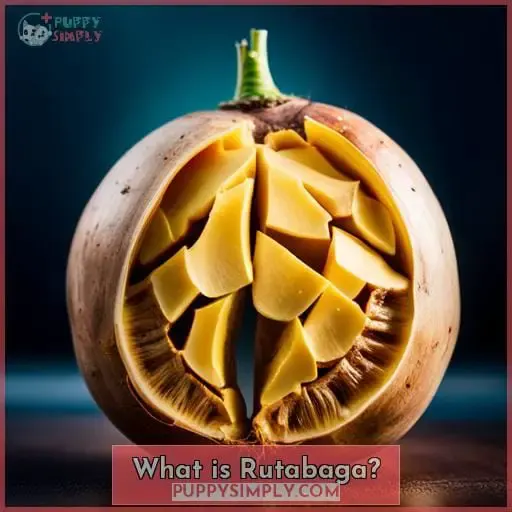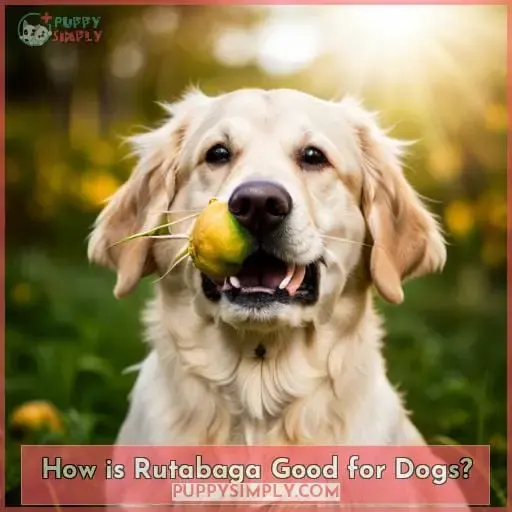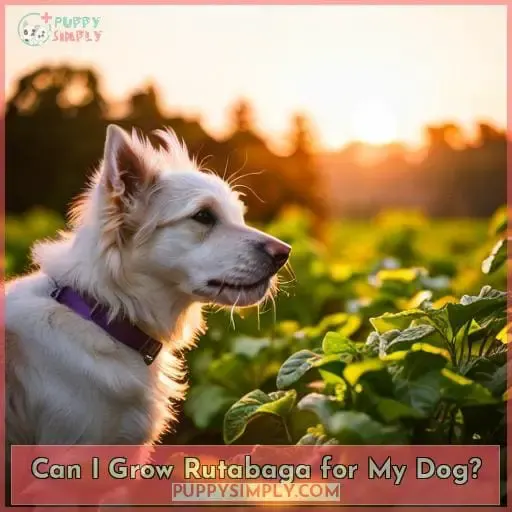This site is supported by our readers. We may earn a commission, at no cost to you, if you purchase through links.
 Do you want to give your pup something new and healthy? Rutabaga, also known as cabbage turnips, is a great veggie for dogs. But can dogs eat rutabaga? Yes! This root vegetable contains vitamins and minerals that benefit your dog’s health.
Do you want to give your pup something new and healthy? Rutabaga, also known as cabbage turnips, is a great veggie for dogs. But can dogs eat rutabaga? Yes! This root vegetable contains vitamins and minerals that benefit your dog’s health.
However, there are some precautions you must take before feeding it to them safely. In this article, we’ll discuss the benefits of rutabagas for pups, how they can be served up in different ways, and what risks may come with overfeeding this vegetable.
Table Of Contents
- Key Takeaways
- What is Rutabaga?
- How is Rutabaga Good for Dogs?
- Can Dogs Eat Rutabaga?
- Can Puppies Eat Rutabaga?
- Can I Grow Rutabaga for My Dog?
- How Can I Safely Give Rutabaga to My Dog?
- What is the Best Way to Prepare Rutabaga for My Dog?
- Are Rutabagas Still Good for Dogs Even if It Has Been Stored for a Long Time?
- Other Vegetables to Serve With Rutabaga
- Is Too Much Rutabaga Bad for My Dog?
- Frequently Asked Questions (FAQs)
- Conclusion
Key Takeaways
- Rutabaga is a vegetable in the cabbage family that can provide various vitamins and nutrients to dogs.
- It is important to prepare rutabaga properly by washing, peeling, and removing hard parts before serving, as well as cutting it into small pieces to avoid choking hazards.
- Rutabaga can be served in various ways such as raw, boiled, steamed, roasted, or mashed, and can be mixed with other vegetables for added variety.
- However, it is crucial to consult a vet for the appropriate serving size based on the dog’s size, age, and breed, and to introduce rutabaga gradually to avoid any potential allergic reactions or discomfort.
What is Rutabaga?
Discover the health benefits of rutabaga for your pup and learn how to prepare it safely.
Rutabaga is a vegetable closely related to cabbage, turnips, and other cruciferous vegetables. It’s packed with essential vitamins and minerals that can give your pup a nutritional boost.
Additionally, rutabagas are low in calories, so they’re great for overweight pups who need to lose weight while still getting their daily dose of nutrients. When preparing rutabagas for dogs, make sure you wash them thoroughly before peeling off the top layer of skin.
You also want to cut them into small pieces before serving, whether cooked or raw, so there won’t be any problems if ingestion occurs during mealtime either way! Finally, it’s important not only to consider safety precautions but also recommended serving sizes.
Aim for about 1/2 cup per day, depending upon the size, breed, and age of the dog. Introduce new foods gradually over time, being mindful of allergic reactions or discomfort should those occur at all times.
How is Rutabaga Good for Dogs?
Benefiting from vitamins, minerals, and antioxidants, rutabaga can help keep your pup healthy – but how much should you give them? Rutabagas are full of nutritional value that dogs need for a healthy diet.
They contain Vitamins C and E, as well as dietary fiber that helps with digestion. The high calcium content makes it an ideal choice to maintain bone strength in older dogs, while the Vitamin K promotes blood clotting.
Additionally, they offer powerful antioxidant properties to combat some of the effects caused by aging on your pet’s body.
When giving these vegetables to your dog, there are a few things you want to watch out for: additives or preservatives may cause reactions; make sure all parts are peeled away before serving; start with small portions at first, then gradually increase if necessary until reaching 1/2-1 cup per day (depending on size); always cook or mash it before feeding raw due to its hard texture, which could be hazardous when swallowed whole; consult with a veterinarian regarding amounts based on individual dietary needs!
Including this veggie into their diets offers numerous health benefits, such as reducing cancer risk, thanks mostly to its low-calorie count, which helps overweight pooches lose weight without sacrificing nutrients needed for growth and development – plus, it adds variety so those picky eaters won’t miss out! Fiber contents also help regulate cholesterol levels while providing essential nutrients like Calcium & Vitamin E not found in other food sources, making rutabaga one vegetable worth adding to every pup’s bowl each week!
Can Dogs Eat Rutabaga?
Can you feed your dog rutabaga? Yes, but it’s important to prepare and serve it correctly. Cooked or mashed rutabaga is generally safe for short-term consumption, while raw should be avoided due to potential choking hazards.
Can Dogs Eat Cooked Rutabaga?
Yes, your pup can enjoy cooked rutabaga for its many nutritional benefits. Just make sure to introduce it slowly and monitor their reaction. Soaking raw rutabaga in water beforehand helps reduce digestion risks, but avoid feeding them too much as that could lead to toxic effects.
For the best taste preferences, cut the rutabaga into smaller pieces after cooking and add some butter or oil on top for extra flavor! Rutabagas are high in beta carotene and vitamins C & K, which help boost immunity while providing essential antioxidants against aging.
Feeding tips include introducing new foods gradually. Start with 1/2 cup per day before increasing the amount if there is no adverse reaction observed from your pet.
Can Dogs Eat Uncooked Rutabaga?
Uncooked rutabaga can be a tricky treat for your pup, so tread lightly before feeding it to them. Rutabagas are rich in vitamins and minerals that promote good dog nutrition, but eating too much of this root veggie can give Fido gas discomfort or worse.
Start by introducing small amounts as a snack, and increase the quantity gradually while monitoring for allergic reactions or any signs of distress.
Cooking methods such as steaming, boiling, or roasting will help ensure nutrients are easily absorbed into your pup’s system while avoiding an upset stomach. Plus, cooked rutabaga is easier to digest! To boost their immune system even further, consider mixing the vegetable with other healthy ingredients like carrots and celery, which also provide essential vitamins and minerals without causing digestion issues.
Keep in mind that overfeeding on uncooked vegetables may lead to vomiting or diarrhea.
Can Puppies Eat Rutabaga?
Puppies can benefit from the vitamins and minerals found in rutabaga, but introducing it into their diet must be done with caution. Feeding a young pup too much of this vegetable could lead to gastrointestinal distress or even more serious issues like kidney stones.
- Start with small amounts and slowly increase over time as you monitor for any reactions such as allergies or an upset stomach.
- Peel off the skin before cooking so that your pup isn’t exposed to potential toxins.
- Serve mashed up after boiling until tender since raw pieces may cause choking hazards.
When socializing puppies, nutritious treats are often part of the process because they help create positive reinforcement while teaching new commands and behaviors at the same time! Rutabaga is a great choice due to its vitamin K content, which helps puppies develop strong bones, plus Vitamin C for healthy eyesight – making it ideal for growing pups who need all those essential nutrients during development stages! But make sure not to substitute regular meals with these treats so that your puppy won’t lose out on other vital vitamins like calcium found in many dog foods today specifically formulated for puppies’ needs — including those designed to support weight loss if needed by providing low-calorie options yet plenty of nutrition benefits at once!
Ultimately, treat feeding should never exceed 10% of total calorie intake per day – ensuring balanced nutrition every step along the way no matter what type of food you choose to provide them. Instead, just be mindful of portion sizes given sensitive tummies dogs have sometimes.
Therefore, take extra care in understanding how it affects overall health and well-being. Each one can live happily ever after, enjoying a long, active life together full of joy, love, and happiness. The end goal, of course, is above all else, to have a happy, safe, and sound puppy playing around the house or backyard without worrying about anything else in the world except running and chasing their favorite toy to their heart’s delight.
Sharing laughter with family and friends alike, wonderful memories are made that will last a lifetime and be cherished forevermore. I hope the best for everyone involved. Thanks for taking the time to read this article and wish you luck on your journey ahead with your furry, four-legged companions.
Cheers to the fun times to come, both in the near future and beyond. Now, stay safe and enjoy life to the fullest possible, wherever, whenever, and however you are able to do so safely and responsibly.
Thank you again for continued reading. Goodbye, friend, and wishes for all the good things that come across your path.
Can I Grow Rutabaga for My Dog?
You can grow rutabaga in your backyard to provide a nutritious treat for your pup, allowing you to control the freshness of the veggie. Rutabagas are easy to grow and require minimal maintenance. They thrive best in cooler climates with full sun exposure and well-draining soil.
Growing Tips:
- Full Sun: Rutabagas thrive in full sun.
- Well-draining Soil: They require well-draining soil.
Storage Advice:
- Store unwashed roots in a cool, dry place.
- Refrigerate cut pieces for a maximum of 1 week.
Nutritional Value:
- Rutabagas are high in Vitamin C and E.
- They are low in calories.
- Rutabagas boost the immune system and reduce the risk of cancer.
Feeding guidelines suggest starting puppies on small amounts of rutabaga and introducing new foods gradually while monitoring for allergic reactions or discomfort. The recommended amount is ½ – 1 cup daily per 40 lbs body weight (about 20 grams).
You can mix rutabaga into their food or use it as a substitute for treats. Serve it raw or cooked by boiling, steaming, or roasting until tender, then mash it before feeding to prevent choking hazards.
Additionally, consider other vegetables like zucchini, kale, and broccoli, which offer additional nutritional benefits. However, avoid vegetables like onions, garlic, leeks, and chives, as they may be harmful to dogs.
By following proper storage advice, growing tips, serving sizes, and considering the nutritional value, you’ll have no problem providing safe and healthy snacks/meals for your furry friend using homegrown veggies like rutabaga!
How Can I Safely Give Rutabaga to My Dog?
Now that you know rutabaga can be a beneficial food for your canine companion, let’s talk about how to safely give it to them. The most important thing is introducing new foods slowly and monitoring the dog’s reaction.
Here are some tips for preparing and serving rutabaga:
- Wash thoroughly before peeling it, removing the top, bottom skin, and hard parts.
- Cut into small pieces so there is no risk of choking.
- Serve raw or cooked – boil until tender, then mash or try steam cooking or roasting instead.
- Start with half a rutabaga per day at first; increase gradually if accepted.
- Mix into food as an alternative treat substitute.
Alternatively, there are other vegetables good for dogs such as zucchini, kale, broccoli, carrots, celery, but avoid onions, garlic, leeks, chives, mushrooms, which could cause harm.
What is the Best Way to Prepare Rutabaga for My Dog?
For your pup, the best way to prepare rutabaga is to peel it, cut it into small pieces, and cook it until tender for a healthy snack. Rutabaga can be served raw or cooked in various ways, such as steaming, boiling, or roasting.
Before feeding your dog this vegetable, start by introducing them gradually in small amounts and monitor for any allergic reactions or discomfort that may occur. It’s recommended to serve 1/2-1 cup of rutabaga per day, but always consult with a veterinarian regarding serving sizes and frequency when introducing new food items safely to your pet’s diet.
| Cooking Methods | Allergic Reactions | Serving Size |
|---|---|---|
| Boiling | Monitor | Start Small |
| Steaming | Increase Gradually | |
| Roasting | Stop if Occurs | |
| Consult Vet |
Are Rutabagas Still Good for Dogs Even if It Has Been Stored for a Long Time?
It’s important to check how long you’ve stored rutabaga, as it can still be beneficial for your pet even after a while – but make sure to follow the same preparation instructions. When considering storage duration, consider the shelf life and expiration date of pre-prepared meals or snacks that contain rutabaga.
Here are 3 tips on storing rutabagas:
- Keep them in an airtight container in a cool place away from direct sunlight, such as the refrigerator or pantry cupboard.
- Check frequently for signs of mold growth.
- Use them within 2 weeks if stored correctly at room temperature, or up to 1 month when refrigerated properly.
When introducing new food into their diet, take care not to overfeed them with too much rutabaga all at once, so they don’t experience any digestive problems like vomiting and diarrhea due to its high fiber content relative to other vegetables like carrots or celery.
Other Vegetables to Serve With Rutabaga
Besides rutabaga, you can try adding other vegetables to your pup’s diet, such as zucchini, kale, broccoli, and carrots. Each of these veggies offers nutritional benefits that will help boost your pup’s immune system and metabolism, along with providing essential minerals and vitamins for their overall health.
When it comes to storing these vegetables, make sure they are kept in an airtight container or bag in the refrigerator until ready for use. Be aware that some dogs may have allergies or sensitivities to certain types of veggies, so introduce new foods gradually while monitoring any reactions before increasing the amount served.
Serving methods should also be taken into consideration when feeding veggie treats. Boil them until tender if serving raw is not recommended. Steam or roast them instead if preferred. Cut up pieces small enough so choking does not occur. Mash cooked veggies before giving them to pups who cannot chew on larger bits yet.
For safety reasons, always check expiration dates on stored food items prior to consumption by both humans and pets alike! Taking all this into account ensures everyone enjoys a healthy snack without any unexpected surprises!
Is Too Much Rutabaga Bad for My Dog?
Too much rutabaga can be a real bummer for your pup, so make sure you consult your vet before dishing it out. Excessive amounts of this veggie can lead to digestive problems such as diarrhea and gas, which doesn’t sound like much fun! If you’re unsure how much your pet should consume in one day, speak with their doctor who will take into account the dietary needs of each individual dog.
Allergies may also occur if they ingest too many rutabagas – look out for symptoms such as vomiting or skin irritation after eating them. Additionally, there are risks to their health that come along with overindulging on this vegetable; too much consumption could cause kidney stones or other side effects due to its high vitamin content.
So while incorporating some cooked mashed up rutabaga into Fido’s diet every now and then is fine (just remember not to serve raw), always check with an expert first if you plan on increasing his portion size regularly – better safe than sorry!
Frequently Asked Questions (FAQs)
Are there any other vegetables that can be served with rutabaga for dogs?
Put forth a spread of vegetables for your pup and mix in rutabaga to ensure they stay healthy! Zucchini, kale, broccoli, carrots, and celery are all great options.
Is it safe to give rutabaga to puppies?
Yes, it is safe to give rutabaga to puppies. Start with small amounts and increase gradually. Be sure to wash, peel, cook/mash before feeding; monitor for allergic reactions or discomfort.
Is there a specific amount of rutabaga that should be fed to dogs?
It’s recommended to give dogs 1/2 to 1 rutabaga per day. Peel and cook it before serving, gradually increasing the amount over time. Monitor reactions – stop if any discomfort is noticed – and consult your vet for advice on amounts.
Is too much rutabaga bad for dogs?
Too much rutabaga can cause diarrhea, vomiting, and even kidney stones in dogs. Therefore, it’s important to feed only the recommended amounts of this vegetable to your pup – 1/2 to 1 per day.
Are rutabagas still beneficial for dogs even if they have been stored for a long time?
Rutabagas can still provide nutritional benefits to your dog, even if stored for a long time. However, wash and peel them thoroughly before feeding and check for any signs of spoilage.
Conclusion
It’s no surprise that the rutabaga is becoming a popular veggie for canine consumption. After all, it offers a wealth of nutrients and vitamins that can benefit dogs. However, it’s important to remember that too much of a good thing can be a bad thing.
Dogs can eat rutabaga, but it should only be served in small amounts and always after being properly prepared. Be sure to consult your vet before introducing your pup to this new vegetable and remember to mix it in with other vegetables as well.
Rutabaga is a great addition to your dog’s diet, but make sure you do it in moderation.















